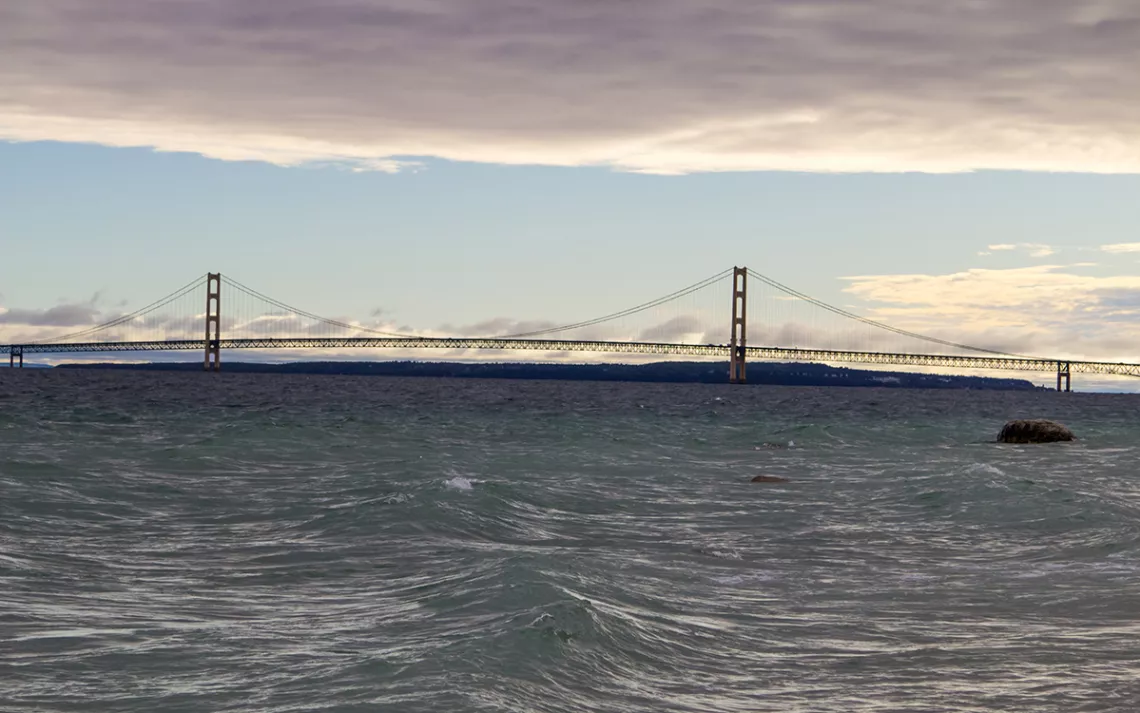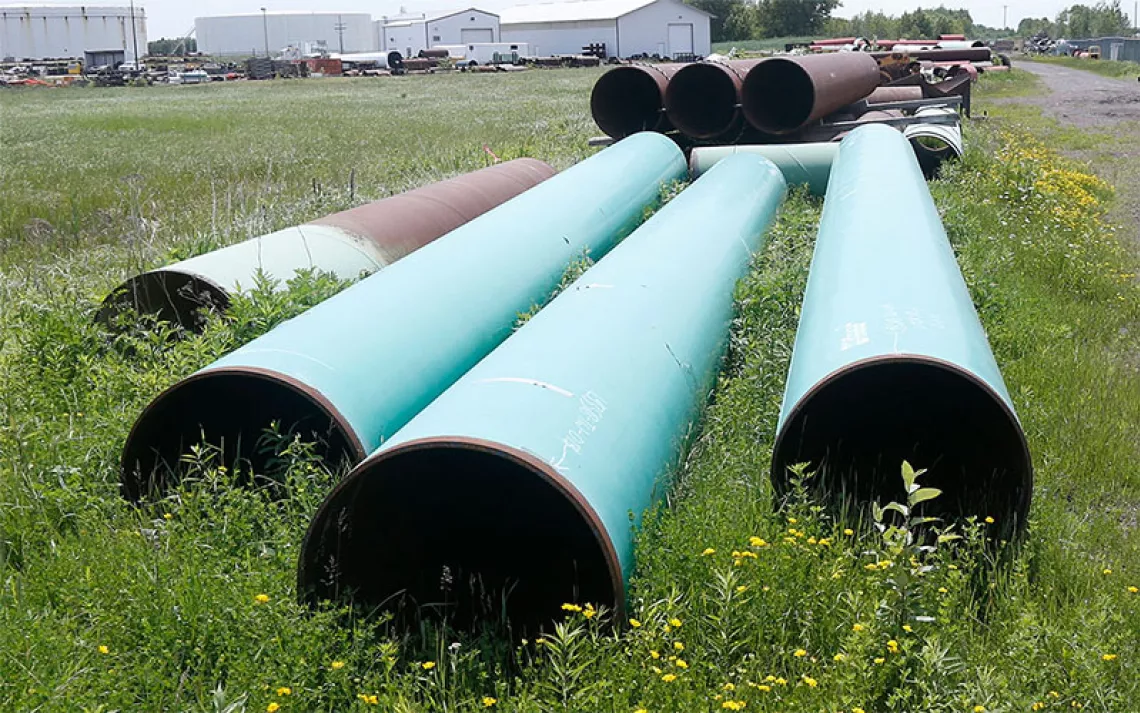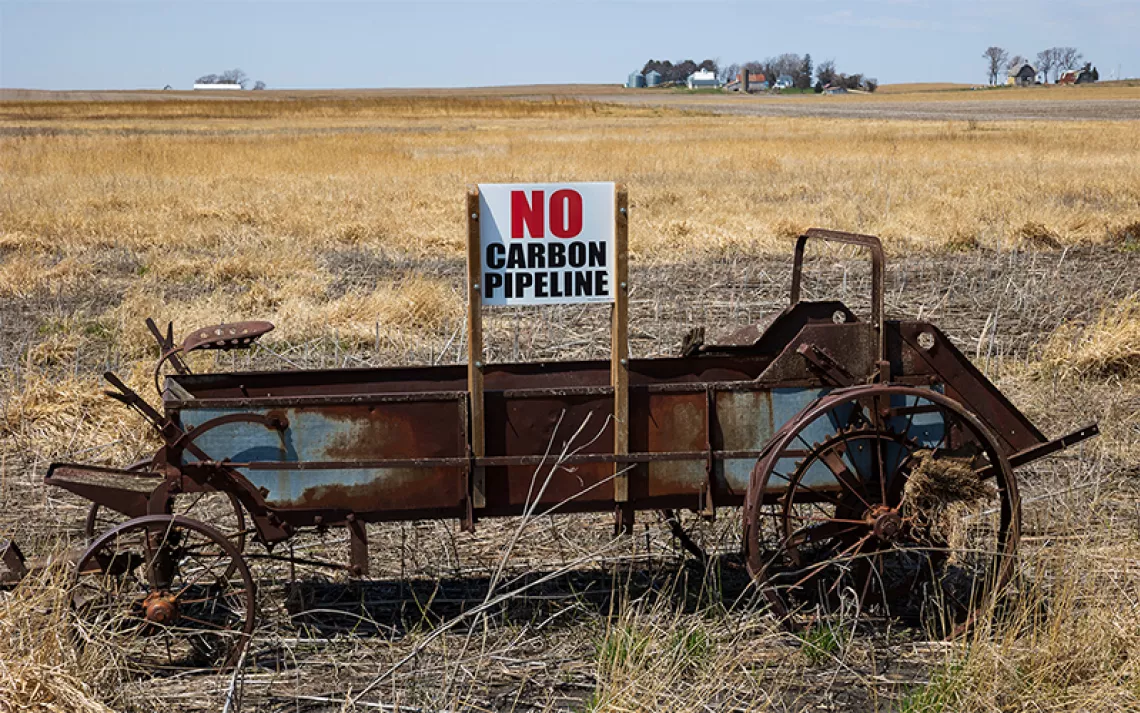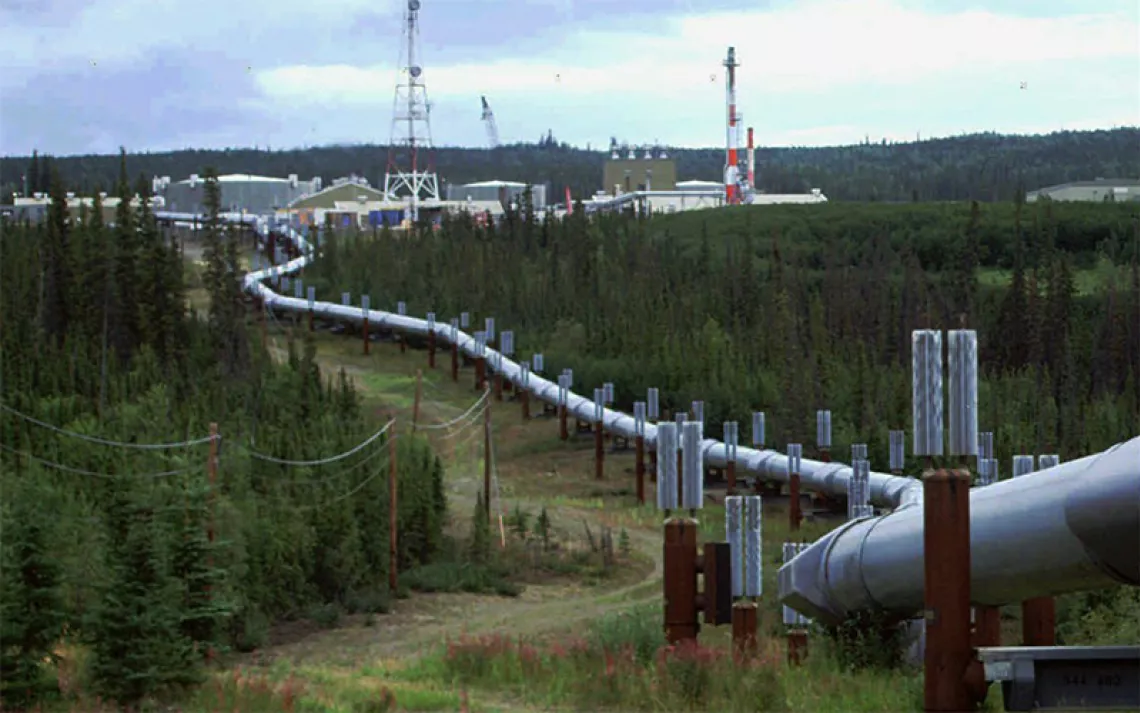Fossil Fuel Company Defies Government Order to Shut Down Michigan Pipeline
As Enbridge scoffs at the law, Governor Whitmer threatens to seize illegal profits

Photo by ehrlif/iStock
By mid-May 2021, there was no longer supposed to be tens of millions of gallons of oil and gas moving daily through a pipeline under the Straits of Mackinac. In November 2020, Michigan governor Gretchen Whitmer revoked an easement for Canadian fuel company Enbridge to keep using its Line 5 fossil fuel conduit. Environmental activists and Native American tribes that had long advocated for shutting down the aging pipeline celebrated.
But the May 12 deadline for Enbridge to stop using the Line 5 pipeline came and went, and the company hasn’t changed its operations. Oil is still flowing through the Straits of Mackinac—located at the point where Lake Huron and Lake Michigan meet—and in doing so continues to threaten the largest freshwater source in the world. Enbridge’s decision to ignore the shutdown order raises an obvious question: How can the company get away with ignoring Governor Whitmer’s directive? The short answer is that Enbridge can’t for very long, although its decision will likely require spending money and time in court.
“Can they get away with it in the sense that, today, they’re still moving oil despite the governor’s order?” said Oday Salim, director of the environmental law and sustainability clinic at the University of Michigan Law School. “They're getting away with it by engaging in unlawful activity, and people engage in unlawful activity all the time. The question is if they’re caught doing it, is there going to be a punishment? Here, I think there is and should be. The state can and should go after them for unjust enrichment to recover those illegally made profits.”
Already, Whitmer has sent a letter to Enbridge making clear her intention to do just that by pursuing trespass and illegal enrichment claims. Enbridge has previously disclosed that those profits could be as much as $1.8 million per day. But the legal issues around Enbridge’s violation of the shutdown order are one thing. The more pressing question is simply when will oil stop flowing through the pipeline?
Longtime proponents of the pipeline have blasted Enbridge’s scofflaw behavior. “Enbridge refuses to shut down Line 5 until there is an emergency—this is how they operate pipelines and this is why we stand behind Governor Whitmer to shut down Line 5 before it is too late,” Beth Wallace, Great Lakes campaigns manager for the National Wildlife Federation, said in a statement.
According to Salim, a main element of the ongoing legal wrangling is the question of jurisdiction. When Governor Whitmer revoked Enbridge’s easement last fall, the state attorney general simultaneously filed a lawsuit in Michigan state court to carry out the governor’s decision and shut down the pipeline. But Enbridge argues that only the US federal government has jurisdiction over pipeline safety and prefers the legal battle take place in federal court. Other complicating factors include the fact that the Canadian government has threatened to fight Michigan’s shutdown order at the federal level.
Enbridge also argues that Line 5 provides jobs and/or fulfills energy needs for residents in Michigan, Ohio, and Pennsylvania and that shutting it down could result in job losses and higher energy costs. Ohio’s legislature has been critical of shutting down the line, citing the potential for job losses in the Toledo area. There are also several Native American tribes with legal claims to the Straits of Mackinac, adding another layer to the legal mix.
The Straits are sacred territory to the Indigenous Ojibwe and they have long demand that Line 5 be shut down. “Line 5 has already spilled oil and natural gas on land and in water tributaries of the State of Michigan,” said Whitney Gravelle, president of the Bay Mills Indian Community, in a statement. “Continued operation is an immediate threat to the vast ecosystem of the Great Lakes, and to give Enbridge another opportunity to endanger such sacred and critical waters considering the company’s abysmal safety track record and documented disregard of Indigenous Tribal Nation’s treaty rights and treaty-protected resources is unacceptable.”
All of those elements could lead to prolonged litigation, though Salim said a judge could still order Line 5 shut down while the case is hashed out.
“Since the briefing between the parties will be over by the end of this month, I would hope a judge could issue a decision in June or July [on whether the case is under state or federal jurisdiction],” Salim said. "This lawsuit could go on for a while longer, but while the lawsuit is pending, let’s make sure we secure this injunction and halt the flow of oil, which reflects nothing more than compliance with the governor’s and the Department of Natural Resources’ order. One would hope that once the jurisdictional determination is made, by the summer or fall of this year, the state would also move forward with an injunction request and we would have some clarity by the fall about where this is going.”
Environmental activists have been longtime opponents of the pipeline’s operation, noting that if the 68-year-old pipeline burst, the resulting oil spill would be catastrophic for the Great Lakes, which supply water to nearly 50 million people in surrounding states and in Canada. Governor Whitmer’s authority for shutting down the pipeline comes, in part, from the state’s public trust responsibility to protect the Great Lakes from catastrophe.
“You're not often going to see a hazardous liquid pipeline flowing through a major water body where the state that the water body is located in happens to exercise pretty full authority over what can and can’t take place under that water body,” Salim said. “That’s what seems so unique here, there’s such catastrophic risk. As soon as any oil comes out of that pipeline, you’re talking about millions, tens of millions, hundreds of millions, maybe billions of dollars’ worth of natural resource damages, economic damages. All of these for-profit businesses that rely on the Great Lakers to thrive. You’ve got [municipal] water systems that rely on it, an entire ecology, not to mention you’ve got so many tribes with rights to those waters.”
In Michigan at least, there is strong consensus that Line 5 is dangerous. In addition to opposition from environmentalists and Native American tribes, many local officials and even some business groups—especially in the hospitality sector—have come out against the pipeline. Whitmer’s administration has certainly taken a more aggressive approach to shutting down Line 5’s operations, but her predecessor, Republican Rick Snyder, also pushed Enbridge to find an alternative route. In 2018, a poll found that 54 percent of Michigan residents supported shutting down the pipeline.
“Most people think the end is probably near,” Salim said. “Not only do you have a very dangerous situation in the Great Lakes, but you have a changing energy economy. We’re not going to be in the same place we are today when it comes to reliance on petroleum that we’re going to be in 100 years, 50 years, even 10 years from now. Generally speaking, people understand the current situation of having the pipeline in the Straits is totally unsustainable.”
 The Magazine of The Sierra Club
The Magazine of The Sierra Club







